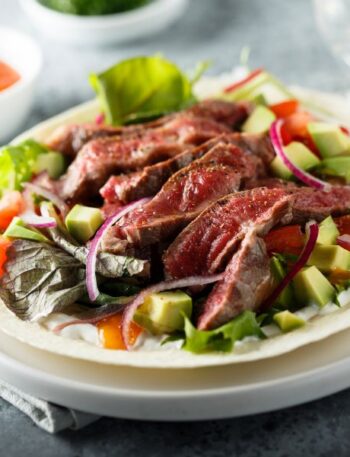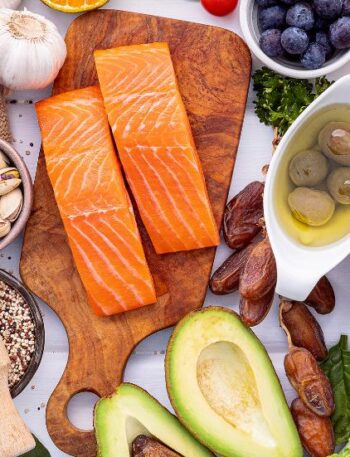Inflammation is a hot topic when it comes to health, and for good reason.
While inflammation is a natural response that helps our bodies heal, chronic inflammation can lead to a range of health problems, including heart disease, diabetes, and even mental health challenges.
The good news is that you can manage inflammation through the foods you eat, and there are plenty of delicious options that can help keep it in check.
What is Inflammation?
Inflammation is the body’s natural response to injury, infection, or harmful stimuli. It’s a protective process where the immune system activates to help heal and protect tissues. During inflammation, the body releases immune cells, blood vessels expand, and chemicals are produced to isolate and heal the affected area.
There are two main types of inflammation:
- Acute Inflammation: This is a short-term response that occurs when the body needs to address an immediate issue, like a cut, sprain, or infection. Symptoms may include redness, heat, swelling, pain, and loss of function in the affected area. It usually resolves once the healing process is complete.
- Chronic Inflammation: This is a long-term, low-grade form of inflammation that can persist for weeks, months, or even years. It can occur when the body continues to send inflammatory signals even when there is no immediate threat. Chronic inflammation is linked to various health conditions, including heart disease, diabetes, arthritis, and certain cancers. It can also be influenced by lifestyle factors such as diet, stress, lack of exercise, and exposure to environmental toxins.
While acute inflammation is essential for healing, chronic inflammation can be harmful and contribute to the development of diseases. Managing inflammation through diet, exercise, stress reduction, and adequate sleep is important for overall health.
What You Need to Put in Your Grocery Cart
Here are the 9 anti-inflammatory foods that I make sure to grab every week – they’re not only great for fighting inflammation but also packed with nutrients that support overall health.
These are foods I genuinely LOVE to enjoy almost every single day, and I want you to fall in love with them too!
When you truly enjoy eating foods that are good for you, it makes maintaining a healthy lifestyle feel so much easier and more enjoyable.
1. Coffee
Yes, coffee makes the cut! Coffee is rich in antioxidants, particularly polyphenols, which help reduce inflammation in the body. Research shows that moderate coffee consumption can lower inflammation and decrease the risk of chronic diseases, such as heart disease.
In a study by researchers at the University of Scranton (Pa.) analyzed the antioxidant content of over 100 foods, including vegetables, fruits, nuts, spices, oils, and beverages.
When compared to the USDA’s data on average U.S. consumption, coffee emerged as the top source of antioxidants, based on both serving size and how frequently it’s consumed(1).
Plus, coffee is a great energy booster that helps kick-start your day. Just be mindful of what you add to it.
- How to Use It: Enjoy a cup of coffee in the morning or try it as an iced version in the afternoon for a refreshing pick-me-up.
2. Avocado/Guacamole
Avocados are one of the most versatile and nutritious foods you can add to your diet. They’re packed with monounsaturated fats, which have been shown to reduce inflammation, as well as fiber, vitamins, and minerals that support overall health.
Guacamole is an easy and delicious way to enjoy avocados, and it’s the perfect addition to salads, toast, or as a dip for veggies.
- How to Use It: Add avocado slices to your sandwiches, blend them into smoothies, or enjoy a side of guacamole with your favorite meals.
3. Nuts
Nuts, such as almonds, walnuts, and cashews, are an excellent source of healthy fats, fiber, and protein, making them a great anti-inflammatory snack.
Walnuts, in particular, are high in omega-3 fatty acids, which are known for their powerful anti-inflammatory properties. These nutrients help reduce inflammation markers in the body and support heart health.
- How to Use Them: Toss a handful of nuts into your salads, yogurt, or oatmeal, or keep a small bag of mixed nuts in your bag for a quick, on-the-go snack.
4. Kefir
Kefir is a fermented milk drink that’s rich in probiotics – the beneficial bacteria that support a healthy gut.
Since a healthy gut plays a key role in reducing inflammation throughout the body, including kefir in your diet can have a positive impact on your overall health. It’s also a great source of protein, calcium, and B vitamins.
- How to Use It: Drink kefir on its own as part of your breakfast, blend it into smoothies, or use it as a base for salad dressings.
5. Salmon
Salmon is a superstar when it comes to anti-inflammatory foods. It’s loaded with omega-3 fatty acids, which have been shown to help reduce inflammation, support heart health, and even improve brain function.
Omega-3s can help lower inflammation by reducing the production of inflammatory molecules in the body.
- How to Use It: Bake, grill, or pan-sear salmon and enjoy it with a side of veggies or add it to salads and grain bowls for a filling and nutritious meal.
6. Chia Seeds
Don’t let their size fool you – chia seeds are small but mighty! These tiny seeds are packed with omega-3 fatty acids, fiber, and protein, all of which have anti-inflammatory benefits.
They’re incredibly versatile and can be easily added to a variety of dishes.
- How to Use Them: Sprinkle chia seeds over your yogurt or oatmeal, mix them into smoothies, or make chia pudding by soaking them in almond milk overnight.
7. Fresh Salsa
Fresh salsa is a flavorful way to add anti-inflammatory ingredients to your meals. It’s typically made with tomatoes, onions, cilantro, and lime juice – all of which have anti-inflammatory properties.
Tomatoes, in particular, are rich in lycopene, an antioxidant that helps fight inflammation.
- How to Use It: Add salsa to your eggs, top your grilled chicken or fish, or use it as a dip with veggies or whole-grain crackers.
8. Dark Chocolate
Yes, dark chocolate can be part of an anti-inflammatory diet! Dark chocolate, especially varieties with 70% cocoa or higher, is rich in antioxidants like flavonoids, which have been shown to reduce inflammation and improve heart health.
It’s a delicious way to satisfy your sweet tooth while providing your body with health benefits.
- How to Use It: Enjoy a small piece of dark chocolate as a treat, add it to your trail mix, or chop it up and sprinkle it over yogurt for a delicious dessert.
9. Leafy Greens
Last but definitely not least are leafy greens like spinach, kale, and arugula. These greens are packed with vitamins, minerals, and antioxidants that help reduce inflammation and support overall health.
They’re a good source of fiber, which aids digestion and supports a healthy gut.
- How to Use Them: Add leafy greens to your smoothies, sauté them as a side dish, or toss them into salads for an easy and nutrient-packed boost.
Tips to Add These to Your Diet
- Start Small: You don’t have to add all these foods to your diet at once. Start by incorporating one or two into your meals each day.
- Mix & Match: Combine these foods to create delicious, anti-inflammatory meals. For example, make a salmon salad with avocado, leafy greens, and a sprinkle of chia seeds.
- Keep It Simple: The easier you make it, the more likely you are to stick with it. For example, keep a bag of nuts in your purse for a quick snack or pre-cut some veggies to dip in guacamole.
Final Thoughts
Including anti-inflammatory foods in your diet doesn’t have to be complicated. By adding these 9 foods to your weekly shopping list, you’ll be well on your way to reducing inflammation and supporting your overall health.
Remember, it’s all about consistency – the more you include these nutrient-packed options in your meals, the greater the benefits you’ll experience over time.
Let me know which of these foods you’ll be adding to your shopping list this week!





